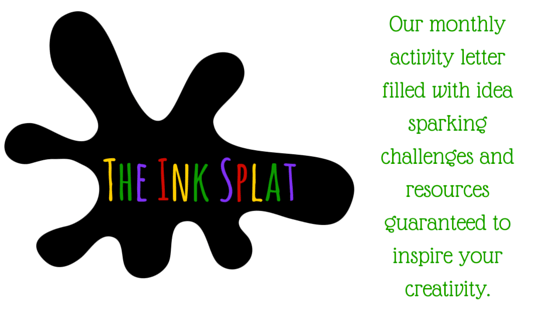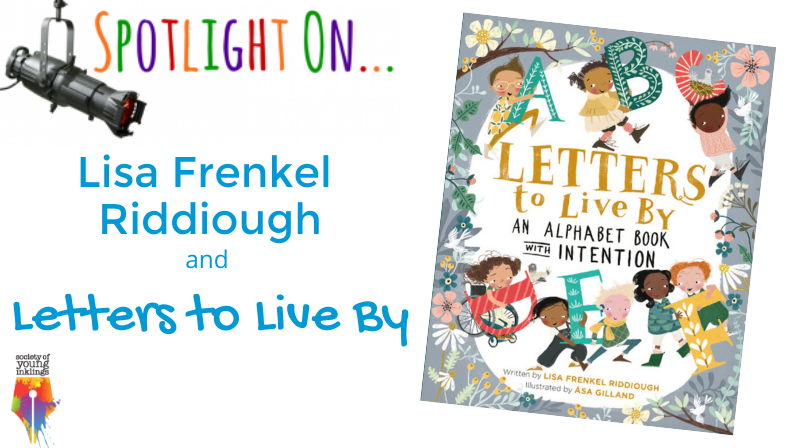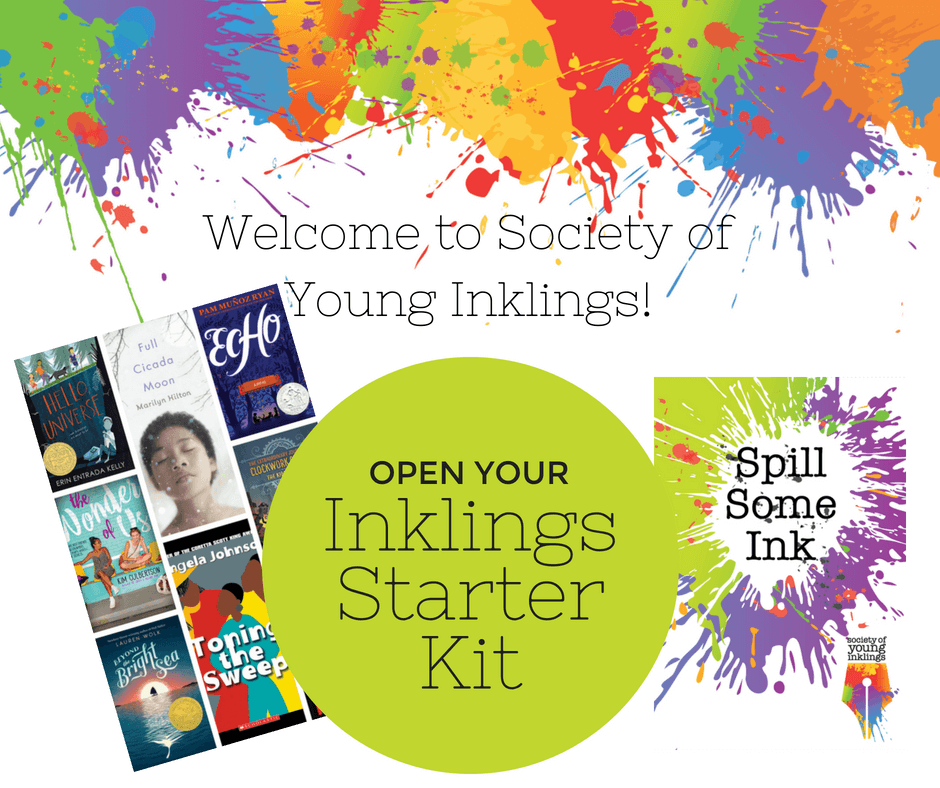For January’s Ink Splat, we spoke to Lisa Frenkel Riddiough about her books Elvis and the World as it Stands and Letters to Live By: An Alphabet Book with Intention. Lisa is one of our creative writing mentors here at Young Inklings and we are delighted to share her books with you this month!

Writing Challenge
from Lisa Frenkel Riddiough
I love the alphabet! It serves us in so many ways (not the least of which is basic communication!). I really like how the alphabet has a built-in structure. It has a beginning, a middle, and an end and can serve as a template or guideline for us in our story writing. What does each letter of the alphabet mean to us? Do we like certain letters more than others? I think we do – though we certainly don’t want to alienate any of them.
Challenge: use the alphabet as a guideline and representation of your story. Write the alphabet out on a piece of paper, leaving plenty of space between letters (you might need more than one sheet – or use a word document on your computer). Now think about your current work-in-progress. Think about themes, character names, places, settings, special objects. Now begin to fill in your alphabet sheet with all these words. For example, if one of your themes is friendship, write that in the “F” column. If your setting is New York City, put that under ‘N.’ Now think of words that you love that you would like to see in your book. Do you love the word ‘pumpernickel?’ Put that under ‘P.’ Carry this list around with you and add to it when something inspires you. Pretty soon, you are going to have an alphabet book of your story – a complete representation from A to Z. How fun is that? When you are stuck in your writing, pull out your alphabet book and take a gander. My guess is that something will spark to life.
Quick! Go write it down!

An Interview with Lisa Frenkel Riddiough
Tell us about the first thing you remember writing in a serious way.
I’m not one of those people who has been writing my whole life. I didn’t come out of the womb and say, “I’m going to be a writer when I grow up.” But I have had writing in my world. I do remember having a poetry book when I was very young. And I love rhyme, and I remember I wanted to figure out words that rhymed. And I do have a book: Chirppy and Charlie. There is a little mark on it that leads me to believe I wrote when I was a seventh-grader. The whole book is felt, and it’s the cutest little thing. It’s in my little nightstand by my bed, and it gives me inspiration for my picture book writing. It’s a story of friendship, and it does remind me that even though I went for decades where I really wasn’t writing, I’ve always had this interest in storytelling.
Let’s talk about Elvis and the World as It Stands and about your inspiration for the book. What sparked that for you?
Elvis is told from the point of view of a shelter kitten. And the seeds of this story come from the many years that I spent with my daughter volunteering at our local shelter in the feline department. I always wondered, how do these cats feel when, all of a sudden, somebody comes in and says, “Oh, I like that one, I’ll take them.” And off they go to this new life; they have no control. Oftentimes, they’re separated from their littermates or their other family members. We want them to be adopted, right? That was the goal, so it was a happy thing. But I spent a lot of time thinking, how do these animals feel, and then what’s happening once they get to their new home? And that idea of feeling out of control of your life led me to other elements of the book, like Elvis, a human girl whose parents are divorcing. She has to go back and forth between their houses and she doesn’t have control over her schedule and what’s happening in her family life. I also was looking at other questions, bigger issues in our world that we have no control over, and the book touches on the tragedies of 9/11.
I feel like we write to answer the questions in our lives that we most need answered. That’s why I write, to try to answer those, to find some sort of truth or answer. And so being able to take the seeds of a story and layer it in different ways is what I was trying to do, along with asking that question in a couple of different ways: What do we do when life feels out of control?
Was it difficult to write from the perspective of animals? You were already wondering what they thought and felt. So did you already feel connected with them?
I grew up with animals and we’ve always had a house full of animals. I feel like I was always anthropomorphizing all the animals all the time, pretending I knew what they would say in a certain scenario. So I think that was natural for me. And, when I was younger, I was drawn to talking animal stories.
For this book, I wanted to represent the challenge of animals communicating with humans and humans communicating with animals in some way. I had to really think about the rules of communication. The animals could all talk, and they could talk to each other and understand each other. They couldn’t speak with the humans. They can understand the humans, but the humans couldn’t understand them. But I wanted to set my story in the contemporary human world, so I didn’t want to go that far with fantasy to the point where they were wearing clothes. They’re in the real world, yet they can speak with each other.
How did you decide how the pets would feel? Did you have to do any research?
We can only guess, and I think you do have to have a certain level of respect for your own guessing. However, you don’t want to get away from who they fundamentally are as an animal. So you’re trying to pay respect to their species, even when you are anthropomorphizing and putting your own creativity and your own ideas onto them.
I did go to the library and get a bunch of books about cats and their physicality, the different types of sounds they make. So I did a basic study on it. I wanted to understand the different ways they move their body, the way they hold their tail, and the different types of yowling or crying or screeching and what that might mean.
Your upcoming picture book, Letters to Live By, is an alphabet book. What are the unique challenges of writing in that particular form?
I love the alphabet. I don’t find the alphabet challenging, but, if you’re going to write an alphabet book, you’ve got 26 letters, and you’ve got to use all of them, right? So the challenge would be using all of those letters and finding your thread, whether it’s an actual story arc that you’re putting in there or a thread that is tying them all together in a unique way that’s beyond the fact that it’s the alphabet. But I love the structure of the alphabet; It’s a built-in beginning, middle, and end. You could take any subject, any idea, any feeling, anything and put it into an alphabet book if you wanted to. But the biggest challenge is that all 26 of the letters need to authentically and perfectly fit into your story or your idea or your concept.
Tell us a little bit about your life as a writer. Do you write every day? Do you write in a certain place?
I definitely don’t write every day. There was a workshop in grad school, and the presenter said, “I write what I want, when I want.” And that was so refreshing to me to hear that because that’s how I am, I’m not super structured in terms of my daily routine, or even my weekly routine. If I’m on a deadline, and I have a goal, then I have to plan it out, put it on my calendar, sit down and write. But when I’m just trying to play with new ideas or get some things going, I like to write when it feels right.
Normally, pre-COVID, I liked to have my little spot at my coffee shop. And I like to be in the world so that the world is happening around me. But I’m not really participating in the world, I just get to sit there and observe. And it makes me feel like I’m in the action, and that inspires me and gives me motivation and energy.
What’s a highlight in your life as a writer?
When I was doing my final edits on my middle-grade novel, my editor said, “Okay, you need to write your acknowledgments page.” And that was the biggest privilege. When I was writing that acknowledgments page, which is basically me saying thank you–to my writing friends from where I got my masters, my family members, my critique partners, the people that have read all my manuscripts–it was such an amazing feeling to say thank you and be able to look back at all these people that I’ve traveled this journey with, and now I have a book to show for it. It was wonderful.

INKLINGS CONNECT
Summer Camps
Join us for a writing camp this summer. We can't wait to see what you create!
Keep your creativity flowing with our upcoming community events:

Thank you to Lisa Frenkel Riddiough for sharing with us! You can buy her books here and check out her website at lisariddiough.com.
Lisa Frenkel Riddiough was a slow reader as a child and found it difficult to concentrate on almost all required reading. When given the choice, Lisa picked books with pictures and lots of white space, and always stories with animals. As a children’s book author, Lisa strives to make her books accessible to this type of reader. In her opinion, it is perfectly OK to choose a book that is short, has a large font, and plenty of illustrations!
Lisa has an MFA in Writing for Children and Young Adults from Hamline University. Her critical thesis was titled, It’s Not Just Talk: How Empathy Elevates When Talking Animals Exist in Contemporary Human Settings – Middle-Grade. In this study, she paid specific attention to the ways in which literary animal and human characters struggle to communicate with one another. It is in this struggle that common ground can be found, ultimately bringing understanding to the characters and expanded empathy to the reader.
Lisa is based in Northern California where she lives with her husband in their empty nest. In addition to writing middle-grade, Lisa writes picture books and “grown-up” short stories and essays. When she is not writing, Lisa enjoys working in the garden, sipping on half-caf iced mochas, and organizing her sprinkle drawer.
She is represented by Jennifer Mattson of the Andrea Brown Literary Agency.
SPARK YOUR CREATIVITY!
As a bonus gift, we’ll send you an Inklings Starter Kit packed with creativity-sparking fun.


